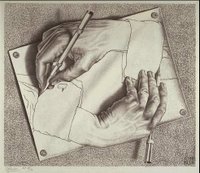If you want to understand how people get along, don't go to the jungle. Go to the internet?
Chatting last night with M, it occurred to me how much people still carry "old culture" behavioural patterns online, whether they realise this or not. M was talking about the differences between Asian and Western music forum users. Both groups seem to obversely display cultural caricatures - Japanese users of music forums, for instance, appear to be more interested in who is looking at their profiles than in actual discussion of music artists, as is the case in the West. This somehow fits with West/Ego individual expression and East/Id collectivist group harmony but of course, ain't ipso facto. This started me thinking about the rest of the online world and led me to thinking about the place of language within this.
It's easier to first state, that the internet is not homogenous. I'm not entirely sure why I need to state this, but somewhere in the light speed squared surge of internet growth, I believe this seemed to be the consensus opinion. The internet would eradicate barriers between countries and we could all eat Micky D's for free in Tian'anmen Square(d). Perhaps if anything, the net has an over-abundance of consumer-users (didn't they used to be called hunter-gatherers). In reality, most people who have access to the internet are more than likely reasonably well-heeled and in possession of a credit card and, with nothing better to do, looking at holidays, cars, trinkets, electronics, media and porn. Yes, they form the main bedrock of the net and express their netizenship through shopping and chatting. However, underlying this trend, don't they still express national/cultural traits.
But of course.
For what forms the bedrock of culture/civilization if not language, both written and oral.
All languages form their own internets? Insomuch as music has it's various idioms and distinctive groupings i.e: Classical; Hip-hop; Jazz; Rock; Folk - they use roughly the same mechanics of "talking" but produce different sounds/effects. Likewise for native languages, which in turn are expressed in the vernacular architecture which finds itself the foundations of these virtual continents.
What does this mean? I've no idea. It just seemed one of those blindingly obvious things, that springs up in the everyday and makes you wonder why you never thought it before,
and this seems to lead into...
The net-frenzy past few weeks, about the awakening of a "2nd Internet" in the form of sweet lovely China. This is purely on a technical basis, if it happens, as China is opting to switch over to it's own backbone rather than using the one that currently resides in the US. Uh-huh, as if this was never going to happen... oh sure, let's do lunch as well darling, just let me fix these rockets first... I like the idea though, of an "alternative" net; variety is the spice of life, ce n'est pas? And the obvious dystopic implications - The great harbinger of global communications that is/was the WWW (should now be read as World War W?) All the misty eyed cyber romanticists go to hell in a cable tie... A net "switch-on" as well to boot... Is there really a grubby wall switch somewhere behind a broken watercooler in a nondescript prefab Mid-West Nowheresville, that not even Mr. Bee Gee with his microzillion disposable softies can lay his calloused pinkies to? Or just more bodily implants gone wrong?
his microzillion disposable softies can lay his calloused pinkies to? Or just more bodily implants gone wrong?
how much of this is racially motivated, I'm not sure... but maybe the cold war never died. It just got a facelift and changed it's name to Culture.
Chatting last night with M, it occurred to me how much people still carry "old culture" behavioural patterns online, whether they realise this or not. M was talking about the differences between Asian and Western music forum users. Both groups seem to obversely display cultural caricatures - Japanese users of music forums, for instance, appear to be more interested in who is looking at their profiles than in actual discussion of music artists, as is the case in the West. This somehow fits with West/Ego individual expression and East/Id collectivist group harmony but of course, ain't ipso facto. This started me thinking about the rest of the online world and led me to thinking about the place of language within this.
It's easier to first state, that the internet is not homogenous. I'm not entirely sure why I need to state this, but somewhere in the light speed squared surge of internet growth, I believe this seemed to be the consensus opinion. The internet would eradicate barriers between countries and we could all eat Micky D's for free in Tian'anmen Square(d). Perhaps if anything, the net has an over-abundance of consumer-users (didn't they used to be called hunter-gatherers). In reality, most people who have access to the internet are more than likely reasonably well-heeled and in possession of a credit card and, with nothing better to do, looking at holidays, cars, trinkets, electronics, media and porn. Yes, they form the main bedrock of the net and express their netizenship through shopping and chatting. However, underlying this trend, don't they still express national/cultural traits.

But of course.
For what forms the bedrock of culture/civilization if not language, both written and oral.
All languages form their own internets? Insomuch as music has it's various idioms and distinctive groupings i.e: Classical; Hip-hop; Jazz; Rock; Folk - they use roughly the same mechanics of "talking" but produce different sounds/effects. Likewise for native languages, which in turn are expressed in the vernacular architecture which finds itself the foundations of these virtual continents.
What does this mean? I've no idea. It just seemed one of those blindingly obvious things, that springs up in the everyday and makes you wonder why you never thought it before,
and this seems to lead into...
The net-frenzy past few weeks, about the awakening of a "2nd Internet" in the form of sweet lovely China. This is purely on a technical basis, if it happens, as China is opting to switch over to it's own backbone rather than using the one that currently resides in the US. Uh-huh, as if this was never going to happen... oh sure, let's do lunch as well darling, just let me fix these rockets first... I like the idea though, of an "alternative" net; variety is the spice of life, ce n'est pas? And the obvious dystopic implications - The great harbinger of global communications that is/was the WWW (should now be read as World War W?) All the misty eyed cyber romanticists go to hell in a cable tie... A net "switch-on" as well to boot... Is there really a grubby wall switch somewhere behind a broken watercooler in a nondescript prefab Mid-West Nowheresville, that not even Mr. Bee Gee with
 his microzillion disposable softies can lay his calloused pinkies to? Or just more bodily implants gone wrong?
his microzillion disposable softies can lay his calloused pinkies to? Or just more bodily implants gone wrong? how much of this is racially motivated, I'm not sure... but maybe the cold war never died. It just got a facelift and changed it's name to Culture.




0 Comments:
Post a Comment
<< Home